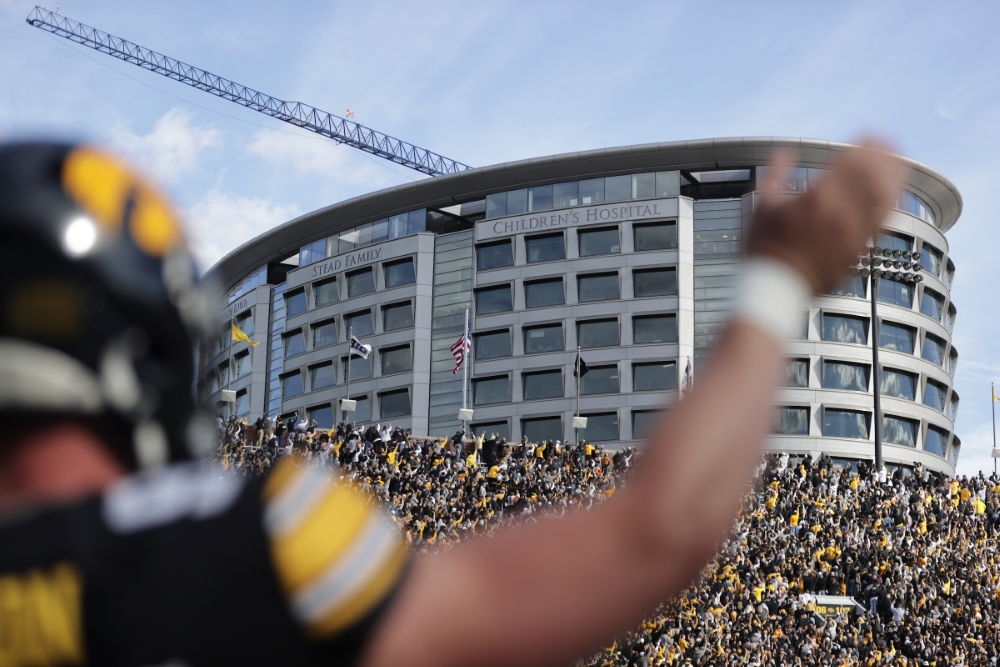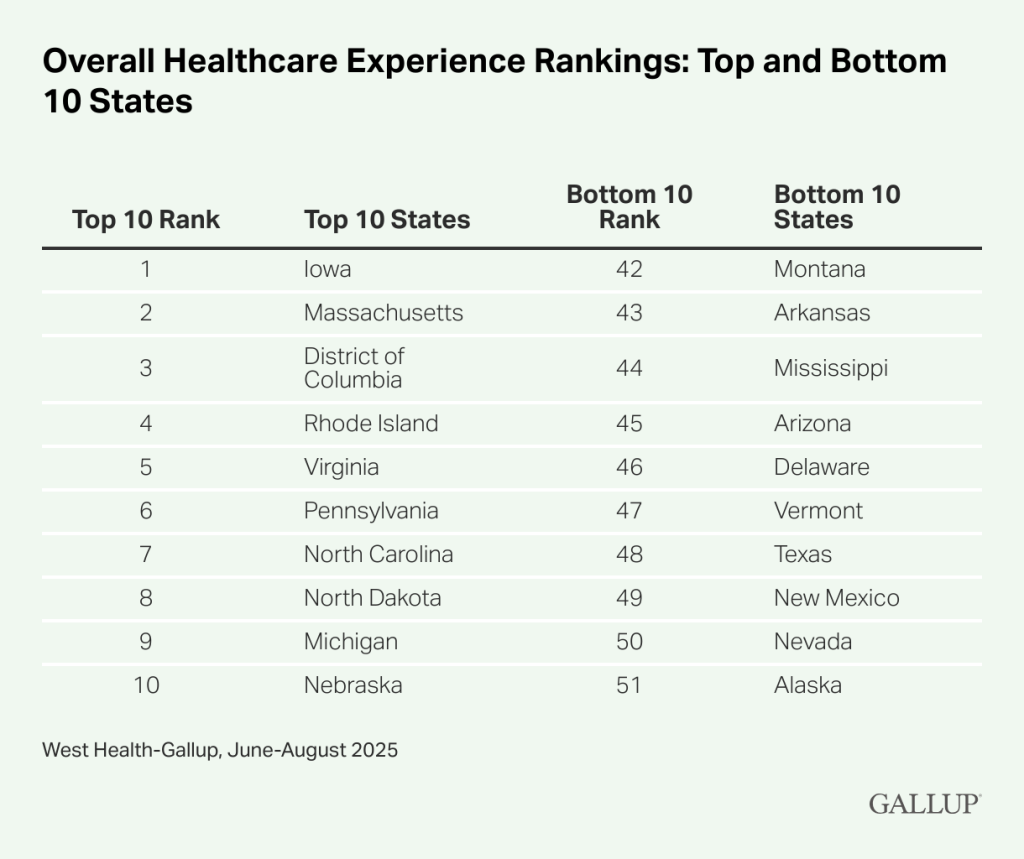

At the end of the first quarter at every University of Iowa home football game, everyone from players to referees to fans waves to children at the University of Iowa Health Care Stead Family Children’s Hospital next door.
Photo courtesy of University of Iowa Athletics
U.S. health care infrastructure might need some remedial help. To improve their grades, some states might look to the home state of ACT and the Iowa Assessments (formerly the Iowa Test of Basic Skills).
The “State of the States 2025: Insights on Healthcare in America” study from Gallup and West Health ranks each state’s performance for its residents’ overall health care experiences, derived from responses to 27 questions answered by nearly 20,000 Americans. The launch of the report this week coincides with the launch of the new Center on Healthcare in America by Gallup and West Health, which offers 20 years of data on the American health care experience. (Site Selection follows AP style, which calls for health care to be written as two words except when part of a proper noun. — Ed.)
Iowa and Massachusetts lead the way among a host of relatively strong performers in the Upper Midwest and East Coast. “Meanwhile, Alaska, Arkansas and Texas showed consistently poor performance across all areas,” the report finds. States also were evaluated separately on health care cost, quality and access, with Massachusetts topping the cost rankings, Iowa atop the quality rankings and neighboring Nebraska No. 1 in access.

The poor report card for Arkansas may see improvement with the forthcoming Bentonville Health Care Campus from the Alice L. Walton Foundation, following a 30-year, $700 million affiliation agreement between the Foundation, Mercy, Heartland Whole Health Institute and Cleveland Clinic in a joint effort to expand access to health care, reduce costs and improve health outcomes in the Heartland.
Rendering courtesy of CannonDesign and v2com newswire
Like the annual infrastructure report card from the American Society of Civil Engineers that gives most of the United States mediocre grades, the new health care report card finds that most Americans feel fair to middling at best. Among other specific findings:
- Massachusetts, Iowa and Virginia all placed in the top 10 for overall health care experience, as well as for cost, quality and access.
- “Those in higher-ranking states are less likely to skip care or prescriptions due to cost, more likely to report high-quality care and less likely to face barriers accessing services.” That said, three in 10 respondents said they skipped a recommended medical procedure, test or evaluation in the past year because they couldn’t afford it. “Nationally, about one in five adults (20%) report that someone in their household was unable to afford a prescription in the past three months,” a release stated. “In Mississippi, this percentage is 36%, three times the rate in Iowa (12%).”
- “Nationwide, 71% of adults say their health care provider ensures they receive all recommended screenings and evaluations. That rate climbs to 78% in Massachusetts and Rhode Island but drops to 59% in Oregon and Wyoming.” Similarly, 72% of U.S. adults “report that their providers offer guidance on healthy lifestyle choices, such as diet and exercise. In Rhode Island, that figure reaches 80%, compared with 63% in Texas.”
- Long wait times for appointments prevented or delayed health care access for 53% of Americans overall. “In Vermont, more than two-thirds of residents (72%) cite this issue,” the report stated, “compared with just 46% in Nebraska, the top-ranked state.”
- “The overall grade for U.S. health care is a C, and not a single state received an A overall or on any individual metrics of cost, quality or access.”
That finding is identical to the ASCE’s 2025 Infrastructure Report Card, which also gave the country a C and no A’s, with the highest grades a B for ports and a B- for rail. The lowest national health care grade? Cost, coming in with a deplorable D+.

Looking for corroboration or contradiction? A June 2025 scorecard from The Commonwealth Fund that evaluated state health systems ranked Massachusetts No. 1, followed by Hawaii, New Hampshire and Rhode Island. Iowa was No. 18. The rankings machine operated by personal finance company WalletHub generated a July report that found New Hampshire, Rhode Island and Minnesota atop the rankings, followed closely by No. 4 Iowa and No. 5 Massachusetts. The Agency for Healthcare Research and Quality (part of the U.S. Department of Health and Human Services) finds many of these same states in the top 10 for health care quality. Like many federal statistics, that finding is based on old data (in this case, a decade-old report), but give the named states points for consistency over time.
In a release, Gallup and West Health noted that the federal government shutdown “underscores the instability of federal policy and funding, highlighting the value of state-level insights to guide dialogue regarding local action to address health care cost, quality and access … The stakes in these debates are high for Americans, potentially costing households hundreds — or even thousands — of dollars each year,” the organizations stated. “This comes at a time when Americans’ inability to pay for care is at its highest point since West Health and Gallup began asking about it in 2021, and millions are already burdened by medical debt.”
The challenges are pervasive, even among top states.
“One in four Americans living in top-10-ranked states report skipping recommended health care due to cost, and over 20% report it is difficult or very difficult to access the health care services they need,” the report finds. “Yet, high-performing states demonstrate ways to better deliver on their promise, offering models for others to follow.” — Adam Bruns

The health care report card from Gallup and West Health ranked Iowa No. 1 in quality, No. 5 in cost (Massachusetts was No. 1) and No. 3 in access, a category led by neighboring Nebraska. The University of Iowa football team will take on the University of Nebraska in the annual Heroes rivalry game on the Friday after Thanksgiving.
Photo courtesy of University of Iowa Athletics
